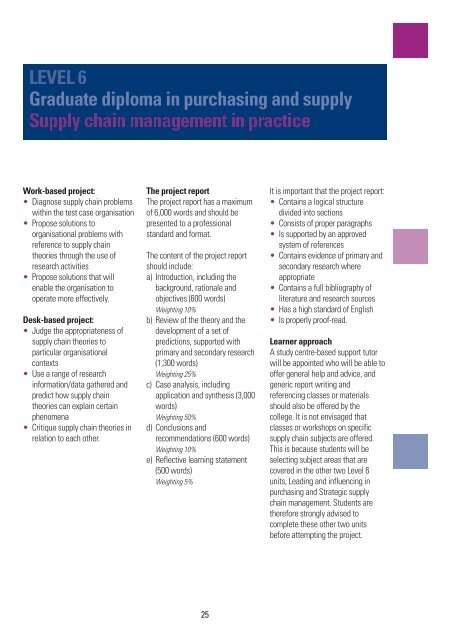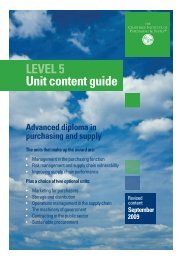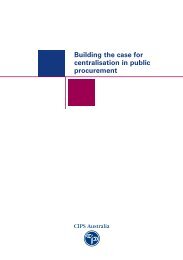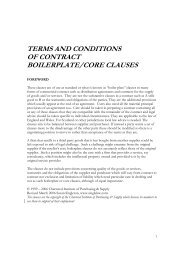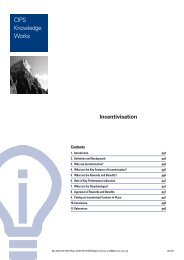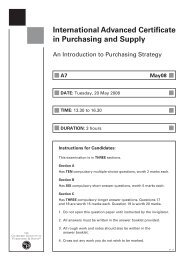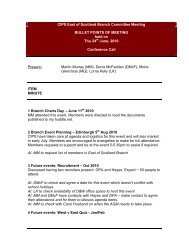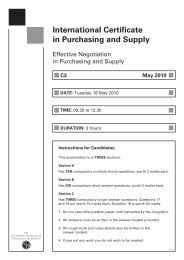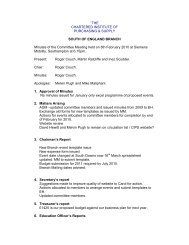Graduate diploma - The Chartered Institute of Purchasing and Supply
Graduate diploma - The Chartered Institute of Purchasing and Supply
Graduate diploma - The Chartered Institute of Purchasing and Supply
You also want an ePaper? Increase the reach of your titles
YUMPU automatically turns print PDFs into web optimized ePapers that Google loves.
Work-based project:<br />
• Diagnose supply chain problems<br />
within the test case organisation<br />
• Propose solutions to<br />
organisational problems with<br />
reference to supply chain<br />
theories through the use <strong>of</strong><br />
research activities<br />
• Propose solutions that will<br />
enable the organisation to<br />
operate more effectively.<br />
Desk-based project:<br />
• Judge the appropriateness <strong>of</strong><br />
supply chain theories to<br />
particular organisational<br />
contexts<br />
• Use a range <strong>of</strong> research<br />
information/data gathered <strong>and</strong><br />
predict how supply chain<br />
theories can explain certain<br />
phenomena<br />
• Critique supply chain theories in<br />
relation to each other.<br />
<strong>The</strong> project report<br />
<strong>The</strong> project report has a maximum<br />
<strong>of</strong> 6,000 words <strong>and</strong> should be<br />
presented to a pr<strong>of</strong>essional<br />
st<strong>and</strong>ard <strong>and</strong> format.<br />
<strong>The</strong> content <strong>of</strong> the project report<br />
should include:<br />
a) Introduction, including the<br />
background, rationale <strong>and</strong><br />
objectives (600 words)<br />
Weighting 10%<br />
b) Review <strong>of</strong> the theory <strong>and</strong> the<br />
development <strong>of</strong> a set <strong>of</strong><br />
predictions, supported with<br />
primary <strong>and</strong> secondary research<br />
(1,300 words)<br />
Weighting 25%<br />
c) Case analysis, including<br />
application <strong>and</strong> synthesis (3,000<br />
words)<br />
Weighting 50%<br />
d) Conclusions <strong>and</strong><br />
recommendations (600 words)<br />
Weighting 10%<br />
e) Reflective learning statement<br />
(500 words)<br />
Weighting 5%<br />
25<br />
It is important that the project report:<br />
• Contains a logical structure<br />
divided into sections<br />
• Consists <strong>of</strong> proper paragraphs<br />
• Is supported by an approved<br />
system <strong>of</strong> references<br />
• Contains evidence <strong>of</strong> primary <strong>and</strong><br />
secondary research where<br />
appropriate<br />
• Contains a full bibliography <strong>of</strong><br />
literature <strong>and</strong> research sources<br />
• Has a high st<strong>and</strong>ard <strong>of</strong> English<br />
• Is properly pro<strong>of</strong>-read.<br />
Learner approach<br />
A study centre-based support tutor<br />
will be appointed who will be able to<br />
<strong>of</strong>fer general help <strong>and</strong> advice, <strong>and</strong><br />
generic report writing <strong>and</strong><br />
referencing classes or materials<br />
should also be <strong>of</strong>fered by the<br />
college. It is not envisaged that<br />
classes or workshops on specific<br />
supply chain subjects are <strong>of</strong>fered.<br />
This is because students will be<br />
selecting subject areas that are<br />
covered in the other two Level 6<br />
units, Leading <strong>and</strong> influencing in<br />
purchasing <strong>and</strong> Strategic supply<br />
chain management. Students are<br />
therefore strongly advised to<br />
complete these other two units<br />
before attempting the project.


